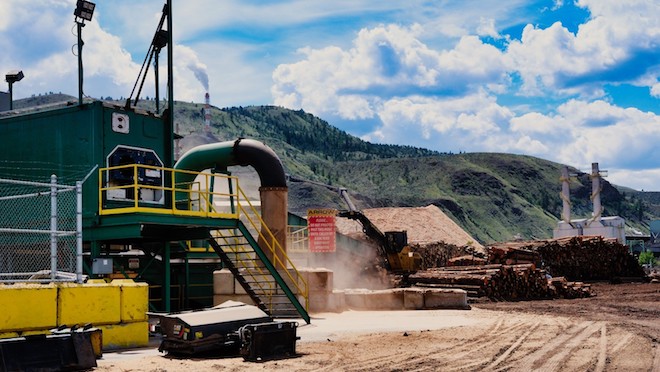 A large capacity all-electric wood chipper and an electric conveyor at Arrow Transportation System's operations in Kamloops have helped improve efficiency and lower carbon emissions.
A large capacity all-electric wood chipper and an electric conveyor at Arrow Transportation System's operations in Kamloops have helped improve efficiency and lower carbon emissions.
Kamloops-based company finds ways to switch off diesel, boost productivity
Part of a series on BC Hydro Clean Energy Champions: businesses, homes, and institutions – large and small – recognized for reducing their reliance on fossil fuels.
Until the summer of 2022, 40 truckloads full of wood chips used to make the almost comically short trip from a Kamloops wood chipper on one side of Mission Flats Road to a pulp mill on the other side of the road every day.
At the same site, logs too large to fit into Arrow's River City Fibre LP chippers would be trucked 25 minutes away to the Tolko Heffley Creek mill just north of Kamloops, then shipped back as chips to the Kruger mill at Mission Flats.
Meanwhile in Fort St. James, another Arrow chipping operation relied heavily again on diesel fuel – in the form of a wheeled loader – to move wood chips from a chipper to a nearby wood chip pile.
Thanks in part to electrification incentives from BC Hydro, Arrow has solved all three of those carbon-intensive challenges by investing in new electrified equipment powered by BC Hydro's clean electricity:
- A large capacity 1500-hp all-electric chipper has replaced two 500-hp chippers at the River City Fiber LP site. It can now process logs up to 33 inches in diameter, negating the need to truck logs to an off-site chipper.
- An electric conveyer that arcs over Mission Flat Road – locals drive under it en route to the Kamloops landfill – now carries wood chips to the pulp mill across the street.
- In Fort St. James, an electric Telestacker conveyer replaces the loader that was burning 120,000 litres of diesel a year. It also stacks the wood pile three times as high as before, allowing for increased wood chip production.
"When we have big energy projects, we come to BC Hydro to talk about electrification," says Jacob Adams, director of sustainability and optimization for Kamloops-based Arrow Transportation Systems Inc. "We might say that we need a bunch of new electricity from BC Hydro, and need to see if they're able to provide us the electricity we need for our goals. And at the same time, they help with the funding that enables a path forward to decarbonization."
As a recognized BC Hydro Clean Energy Champion, Arrow Transportation Systems Inc. isn't limiting its decarbonization efforts to Kamloops and Fort St. James. Another recent upgrade is at the new North Shore Recycling and Waste Centre in North Vancouver, where an all-electric mobile payload optimizer has eliminated the need for a diesel excavator and reduced diesel truck use in the transfer of compost and green waste at the Riverside Drive facility.
'You can't go bankrupt trying to go green'
A lot of number-crunching has gone into planning for Arrow's energy-efficient upgrades and electrification. Thanks in part to BC Hydro incentives for the four Arrow projects mentioned above, Adams has been able to make the case for accelerating his company's sustainability efforts.
"A lot of companies say, the right thing to do is to invest in sustainability, but you can't go bankrupt trying to go green," says Adams, who accepted the Kamloops and District Chamber of Commerce sustainability leadership award on behalf of Arrow in 2023. "The great thing about these projects is that they're not just of good for the environment, they're good for the bottom line. And they're really good for our customers as well."
They're also good for workers. Adams notes that a lighting upgrade project completed this past winter replaced 2,300 light fixtures at 26 Arrow facilities across B.C.
"It's a lot better for our workers: easier on the eyes and brighter," he says. "Our shops are open 24 hours a day, so being able to have good lighting – especially in Northern B.C. when it's minus 20 out and you're in a shop working on something – makes a big difference."
Arrow has emerged as a leader in transportation, logistics, environmental and forest residual management. They acquired River City Fibre in 2016, and in May 2023, Simpcw Resources Group, the economic-development arm of the Simpcw First Nation, made a significant equity investment in the facility. Arrow and Simpcw Resources Group operate the facility under a newly formed limited partnership, River City Fibre LP.
River City Fibre LP has recently helped weather a general shortage of logs suitable for wood fibre in B.C. by using wildfire-impacted wood, much of it from Simpcw territory.
River City Fibre LP processes low-value pulp logs and salvaged timber into wood chips, hog fuel, and sawdust for the Kruger pulp mill. Wood chips must meet specific quality specifications to ensure the production of high-quality pulp at the mill, which employs more than 300 people.
And it helps if conveyors, rather than diesel, move those chips to where they're needed.
"The electric conveyor that replaces trucking here in Kamloops eliminates bottlenecks we had with trucking," says Adams. "Now we never have to worry about not enough trucks showing up or the chips piling too high and shutting down the plant. Our run time has been significantly higher, and our costs have gone down. There's a lot of upfront capital for this equipment, but over the lifetime, it's a lot cheaper to move products via conveyor than it is via truck."